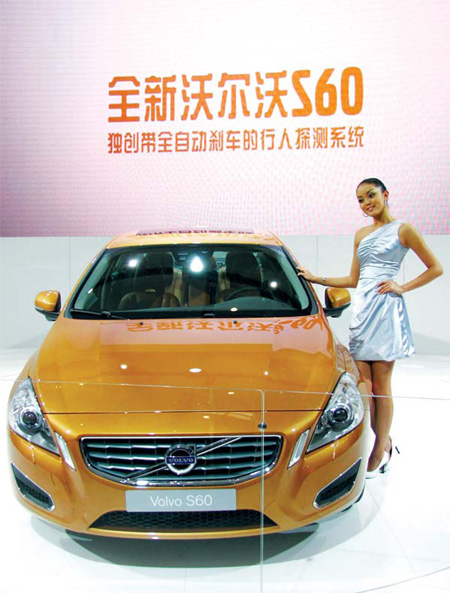Business
Volvo: Solid first year under Geely
Updated: 2011-08-29 10:17
By Gong Zhengzheng and Han Tianyang (China Daily)
|
 With the S60 selling well, Volvo plans to bring the V60 estate version to the Chinese market following the Guangzhou Auto Show later this year.[Photo/China Daily]
|
Two local production facilities planned after last year's $1.8 billion acquisition
BEIJING - Despite concerns that Volvo Car Corp's sales could tumble after its purchase by Zhejiang Geely Holding Group Co last August, the Swedish brand has registered solid growth.
In the first six months of this year, Volvo's sales worldwide totaled 230,746 units, an increase of 20 percent over a year earlier. The carmaker's China sales rose 36 percent to in the period 21,000 units, the company said at a recent news conference in Beijing.
It had 1.2 billion kronor ($190 million) in operating profit in the first half, a figure described as a "brilliant" by Freeman Shen, senior vice-president of Volvo Cars and chairman of Volvo's China operations.
"Volvo has had a smooth transition after the acquisition and as one year has now passed, our sales, profit and team are all quite stable," Shen told the media.
"After the transition period, we now seek (further) development," Shen said, noting that growth in China is one of the most important components of Volvo's global business.
But significant growth will only come after the company opens local plants to produce cars, Shen said.
Before owned by Ford Motor Co, Volvo was acquired by Zhejiang Geely, the parent company of domestic carmaker Geely Automobile, for $1.8 billion last year.
The company opened its China headquarters in Shanghai at the beginning of this year, where it also began moves to establish an R&D center that will focus on the design and development of premium cars as well as electric and new-energy vehicles.
The company plans to build plants in the southwestern city of Chengdu and Daqing in northeastern China. Shen said that both facilities await government approval.
A big question is that what Volvo models owner Geely will build in China, one Shen declined to answer. He noted R&D work has begun at the Shanghai center on two models scheduled for local production in 2013 and 2014.
He emphasized that the wholly owned brand does not have many of the difficulties faced by joint ventures, so the company will bring all Volvo's technologies to consumers in China.
Brand campaign
Volvo unveiled its new brand campaign at the news conference, which has the slogan "Designed Around You" - or "Yi Ren Wei Zun" in Chinese - stressing the people-oriented spirit of the Nordic brand.
Volvo now has 117 dealerships in 83 cities in China and is continuing to expand by two new outlets every month on average, said Richard Snijders, Volvo's China sales chief.
By 2015, the number will surpass 200, he said.
The company announced in February that it aims to sell 200,000 cars in China annually by 2015.
Snijders said Volvo is confident it will hit the target because growing wealth among Chinese consumers will create increasing market demand.
He noted that the premium car market in China will continue to have at least 30 percent annual growth, although the pace will be slower than the last two years.
Analysts said Volvo must expand its local product portfolio to meet its ambitious goal.
The company now imports only its C30 and C70 coupes, S60 sedan, and the XC60 and XC90 SUVs to China. Volvo also makes the S40 and S80L models in the country at a joint venture between Ford Motor Co and Chongqing Chang'an Automobile Co under contracts that will expire in 2015 and 2018.
Shen said Volvo plans to bring its V60, the estate version of the S60, to the Guangzhou auto show later this year and formally launch the model in China next year.

Specials

Flying the TCM flag
A small German town is home to Europe's flagship clinic for traditional Chinese medicine

Hunting grounds
Opinion divided as China debates opening door to international players

Animal attraction
World's youngest chief fur designer set to launch own label and tap into huge China market.